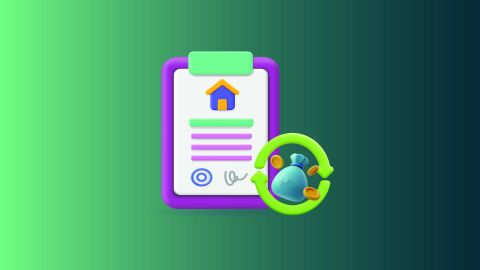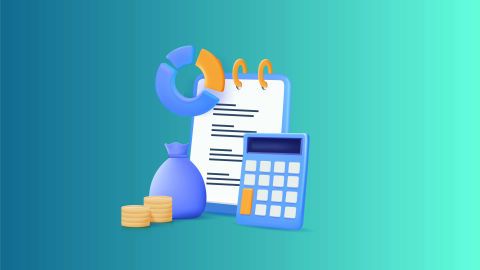Chennai property tax
Property tax in Chennai is levied on buildings and vacant land unless specifically exempted and is regulated and collected by the Greater Chennai Corporation. The tax is a mandatory obligation for all property owners within the city limits, and non-payment can attract penalties on the assessed value.
To calculate property tax, the Greater Chennai Corporation follows the Reasonable Letting Value (RLV) method to determine the Annual Rental Value (ARV) of a property. This ARV is then used to compute the half-yearly property tax payable. The monthly RLV is calculated based on the basic rate per square foot fixed by the Corporation for residential and non-residential properties, taking into account the property’s location and usage.
What is Chennai Property Tax?
The Chennai Municipal Corporation has 15 zonal divisions and for tax purposes, the properties here are earmarked into two categories, namely residential and non-residential. Shops, offices, malls, and theatres are categorized as non-residential properties, while the rest are all clubbed under the residential category. As per the CCMC Act, all properties in Chennai are assessed together with the plot and the nearby premises they occupy. Added to this, the assessor also estimates the expected gross annual rent on the property, and it is added to the annual value for property tax in Chennai.
This apart, the government specifies that any building that has been kept vacant for 30 consecutive days or more will have a Chennai property tax online exemption. Irrespective of whether the property is rented or occupied by the owner and has been vacant, you can claim remittance only up to an amount not exceeding one-half of your total tax dues.
Timely payment of property tax is essential for staying compliant, but why not take it a step further? Unlock your property's financial potential with a loan against property. This secured loan provides access to substantial funds without giving up ownership, making it ideal for business growth, education, or achieving personal goals. By leveraging your property's value, you can benefit from flexible repayment options and attractive interest rates, turning your asset into a powerful financial resource. Get loan of up to Rs. 10.50 crore against your property within 72 hours* of the approval.
Required documents for paying Chennai property tax
To pay property tax in Chennai, property owners are required to submit certain documents to ensure a smooth and efficient process. Below is a list of the necessary documents:
- Property tax assessment form: The official form issued by the Chennai Corporation for property tax assessment, containing details about the property such as its address, size, and usage.
- Sale deed or title deed: This document serves as proof of ownership of the property. It may be needed if the property has recently changed hands or if there has been a transfer of ownership.
- Previous property tax receipt: A copy of the most recent property tax receipt, which helps verify the payment history and any outstanding dues.
- Property Identification Number (PID): A unique identification number assigned to the property by the local municipal authority, which is used to track tax records.
- Building plan approval: A copy of the approved building plan issued by the Chennai Corporation, particularly for newly constructed or altered properties.
- Occupancy certificate: For newly constructed properties, an occupancy certificate from the local authorities is often required.
- Address proof: A government-issued address proof of the property owner, such as an Aadhaar card, Voter ID, or Passport, to verify ownership details.
- Receipt of last paid water tax: If applicable, the receipt for the most recent water tax payment may be requested, as it links the property tax to municipal services.
These documents are essential for both online and offline property tax payments to ensure timely processing.
Having these documents organised simplifies tax payments and can also unlock financial opportunities. For instance, Bajaj Finance provides loan against property, enabling you to access substantial funds for business expansion, education, medical expenses, or debt consolidation. With competitive interest rates, flexible repayment options, this loan helps you leverage your property's value while retaining ownership. Also, enjoy lower EMIs starting from Rs. 750/lakh* and longer repayment tenures.
Eligibility criteria for Chennai property tax
The eligibility criteria for paying property tax in Chennai are based on property ownership and usage. Below are the key requirements:
- Ownership of property: Any individual or entity owning a property within the Chennai city limits is eligible to pay property tax. This includes residential, commercial, and industrial properties.
- Registered property: Only properties that are legally registered with the Chennai Corporation can be taxed. Owners must provide proof of ownership, such as the Sale Deed or Title Deed.
- Occupied or vacant property: Both occupied and vacant properties are subject to property tax. The tax rate may differ based on whether the property is being used or is unoccupied.
- Type of property: The property tax is levied based on the type of property (residential, commercial, industrial) and its usage. Different rates apply depending on the category.
- Building and land: Property tax is calculated on both the built-up area and the land area of the property, with separate rates for each.
Eligibility criteria make sure you can pay your Chennai property tax in a way that works best for you. While the payment process may take more time, it is always good to maintain a record of your payments. These records can be vital if you choose to monetise your property through a loan against property in the future. By pledging the value of your own property, you can access large funds—all with flexible repayment options and competitive interest rates. Get a loan of up to Rs. 10.50 crore with the option of interest-only EMIs during the initial tenure
Property tax Chennai calculations
The Greater Chennai Corporation has revised the property tax calculation method to make it more location-specific. Instead of relying only on area-based rates, the new system calculates tax based on the street on which the property is located, while also factoring in construction cost and overall property value.
Under the revised framework, property tax is computed using the Reasonable Letting Value approach, as explained below:
Half yearly property tax formula
Half yearly tax = Base Street Rate (BSR) × Building area × 135.40
The factor 135.40 accounts for depreciation, maintenance charges, and land value.
How the Base Street Rate is derived
BSR = Monthly rental value ÷ 800
Monthly rental value = Annual rental value ÷ 12
Annual rental value = Property value × 0.35 percent
How property value is calculated
Property value is calculated using the following components:
- Area × guideline value
- Cost of construction
- 22.5 percent of the construction cost
- 20 percent of the building cost
Cost of construction = Built-up area × PWD rate
Important points to note
- For certain premium locations, such as AF Block, Anna Nagar, the base street rate has been revised.
- If the original BSR is 1, it may be increased to 1.5 in line with government notifications allowing property tax revisions of up to 50 percent.
- For any additional built-up area, the applicable base rate is increased by 10 percent.
This updated method ensures that Chennai property tax reflects both location value and construction quality more accurately. For quick and error-free calculations, property owners can also use the official Chennai Municipal Corporation online portal to compute and pay their property tax conveniently.
Property tax rates in Chennai
Property tax rates in Chennai are calculated based on the annual value of the property. The applicable half-yearly tax percentage includes both general tax and education tax, varying across different value slabs.
Annual value |
Half-year tax (as a percentage of A.V.) |
|
|
General tax + education tax |
Lib. (less) |
Re. 1.00 to Rs. 500.00 |
3.75% + 2.50% |
0.37% |
Rs. 501 to Rs. 1,000 |
6.75% + 2.50% |
0.67% |
Rs. 1,001 to Rs. 5,000 |
7.75% + 2.50% |
0.77% |
Rs. 5,001 and above |
9.00% + 2.50% |
0.90 |
Unlock your financial potential with a loan against property
Now that you are familiar with Chennai’s property tax, it is time to consider personalised financial solutions that suit your needs. Whether you are looking to expand your business, fund education, or cover medical emergencies, a Bajaj Finserv Loan Against Property allows you to tap into your property's value. With attractive interest rates, flexible repayment plans, quick loan approval, and easy eligibility criteria, Bajaj Finance makes it simple to access the funds you need.
Bajaj Finserv Loan Against Property
Armed with insights into Chennai’s property tax, explore financial options with Bajaj Finserv Loan Against Property. Whether it's business expansion, educational funding, or medical expenses, tap into your property's value with Bajaj Finserv Loan Against Property. Enjoy attractive loan against property interest rates, flexible repayment plans, swift approval, and an effortless online application process. Get a loan of up to Rs. 10.50 crore with the option of interest-only EMIs during the initial tenure.
Here are a few benefits of applying for a Bajaj Finserv Loan Against Property:
- Attractive interest rates: Bajaj Finance provides competitive interest rates for cost-effective borrowing.
- Quick approval: Experience swift loan approval and disbursal, ensuring timely access to funds.
- Easy eligibility: The loan against property eligibility criteria are simple, making the loan acquisition process hassle-free.
*Terms and conditions apply.
Steps to pay property tax in Chennai online
To know more about the steps to pay Chennai property tax online, read on.
- To start with, head to the official Chennai Municipal Corporation online portal and on the homepage look for the ‘Online Civic Services’ tab
- Click the ‘Online Civic Services’ tab to find a list of options. From here, select the ‘Property tax’ option
- Listed on the next page, you will see the Chennai corporation property tax status option, property tax rules, register phone number, and many other Chennai corporation property tax-related options. From here choose ‘Property Tax Online Payment’ to complete your Chennai property tax payment on the next page
- At this stage, you will have to fill in a form with the right details for your zone number, division code, bill number, and sub number. To be sure of the details, keep a property tax bill handy and check and enter the details in the form basis the bill. This will ensure that you enter error-free information in the form, leaving no room for discrepancies
- Once you complete the form and hit ‘Submit’, you will be able to see the outstanding Chennai property tax amount and then you can click ‘Pay Online’ to make the payment
- You can use your debit/ credit card or opt for UPI payments to complete your Chennai property tax payment. Once the transaction is successful you will get an acknowledgment on the screen and a receipt that you can download and keep handy as proof of payment
The Chennai Municipal Corporation makes it very easy for property owners in Chennai to pay property tax online. Make your Chennai property tax payment by following a few easy steps.
Keep these tax norms and easy payment of Chennai corporation property tax in mind as a property owner in Chennai.
Keeping the important factors about Chennai corporation property tax in mind, you can now go ahead and invest in a property in Chennai to enjoy maximum tax benefits. For hassle-free loan processing and affordable rates of interest, choose Bajaj Finserv. Here you can get a high-value loan against property that comes with simple eligibility terms and conditions.
Chennai property tax due date & rebate
You can get considerable rebates on your Chennai corporation property tax, which are as follows.
- 10% library cess on your General Tax
- 20% rebate on the Monthly Rental Value for semi-permanent buildings
- 25% rebate on the Monthly Rental Value for owner-occupied residential buildings
- 10% rebate over the Monthly Rental Value for an owner-occupied commercial portion
- 1% depreciation is provided for each year for buildings that are over 4 years old (subject to a maximum rebate of 25%)
Keeping these concessions and the total value of property in mind, you can pay your Chennai corporation property tax twice a year by September 31st or by March 31st. The best part is you can pay your Chennai property tax online any time you want. This makes it easy for you to adhere to deadlines in order to avoid unnecessary fines.
Frequently asked question for property tax in Chennai
You can calculate your property tax in Chennai either manually or online at the official Greater Chennai Corporation. For manual calculation, use the formula:
Plinth area x basic rate per sq. ft. + annual rental value
In Chennai, the basic rate on your residential property ranges between Rs. 0.60 per sq. ft. and Rs. 2.40 per sq. ft. For non-residential properties, the rate varies from Rs. 4 to Rs. 12 per sq. ft. When doing the manual calculation of property tax in Chennai, keep the formula in mind and subtract the depreciation value and exemptions from your total to arrive at your final dues. Count in repairs or maintenance carried out too.
If calculating this online, select ‘Property Tax Calculator’ under ‘Property Tax Payment’. Choose the zone, ward, and street name and enter details regarding the floor details, number of owners, and tenants. Once done, click on ‘Calculate Demand’ to see the relevant amount to pay as property tax in Chennai.
It is important that you make timely property tax payments in Chennai, as any transaction on said property will require a receipt of ‘No-Dues’. The corporation levies a 2% penalty fee over the tax payable for all defaulters after a grace period of 15 days.
Yes, there could be. If you are using a credit card or the net banking facilities to pay your property tax online in Chennai, there are nominal charges that could vary from time to time.
Failure to pay property tax on time in Chennai can result in penalties, interest charges, and possible legal action. The property may also be seized if taxes remain unpaid for extended periods.
If financial constraints are preventing you from meeting this obligation, consider a loan against property from Bajaj Finance. This secured loan lets you access funds by leveraging your property’s value, ensuring you can clear tax dues or manage other financial needs. With competitive interest rates, quick approval, and flexible repayment options, it’s a smart way to protect your property and maintain financial stability.
Yes, property tax payments can be made via the Namma Chennai App. The app allows users to view tax dues, make payments online, and access receipts for their records.
Yes, rental values for Chennai property tax are periodically revised by the Chennai Corporation. These revisions are based on factors like property location, type, and market trends to ensure fair tax assessments.








